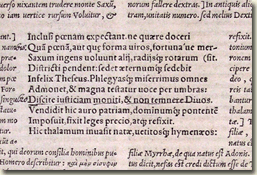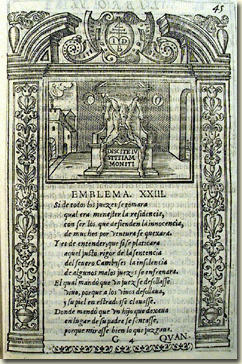In the chapter dedicated to Phlegyas –
the king of the Lapithes, who burnt down the temple of Apollo
at Delphi – Baltasar de Vitoria quotes and translates into
Spanish a verse that Virgil puts into the mouth of the king.
Phlegyas, for his impious act, was condemned to keep shouting
aloud, in the Inferno, "Discite iustitiam, moniti, et non
temnere divos" (learn justice, you admonished, and be not
disrespectful towards the gods). But Baltasar de Vitoria also adds a surprising
story:
And by the way I tell you the story
that I heard from a priest, a man of great veracity, who, being
called to one possessed by the devil, asked the demon
which was the best verse of Virgil, and it responded that this
was:
Discite iustitiam, &c.
The judgement of the demon
might be influenced by the fact that this verse of Virgil is
pronounced in the Inferno, and will be ringing there for an
eternity, and that those condemned for impious acts – indeed,
such as Lucifer himself – must hear it with a special horror: this is
the case of Salmoneus*, Tantalus, Sisyphus and other obstinate
rebels against the gods. And its impact must be that much greater, as the
commentary by Servius explicitly tells us that this imperative was
directed towards those "now undergoing punishment".
This does not lack in paradox, for how should they accomplish this order in those
circumstances?
* On Salmoneus, king of Elis, who
dared to compare himself to Jupiter, a complete tragedy was
dedicated by Joost van den Vondel («Salmoneus», Amsterdam 1657),
which bears on its frontispiece, as a motto of the work, this
admonishment by Virgil (cf. its digital edition in
dbnl).
Apart from the situation in
which it is pronounced, the greatness of this verse is due to the
perfect symmetry and sententiousness with which it marks the
duties of the prince towards his inferiors and his superiors,
towards his subjects and towards the gods. Exactly these duties are
emphasized – although generalized, concerning everyone –
by Lipsius in his De constantia.
Thus it is no surprise that in a copy of
the authoritative Basel 1562 edition of Virgil's Opera omnia
edited by Georgius Fabricius (1516-1571), conserved in the
Hungarian Academy of Sciences, this verse is underlined – as if it were a motto
– by the same Renaissance hand who numbered
the verses of this book:

That this verse in effect functioned as a
kind of motto, or sentence of common use, is attested by its
presence in many poliantheae: thus for example in that of
Joannes Langius (Basel 1613), where it appears under the
concepts "Justice" and "Fear of God". It also figures as a motto
of emblems in Juan de Horozco's Emblemas morales (2.23,
f. 45) or Juan de Solórzano Pereira (Emblem 19), always with
reference to the work of judges.
Nevertheless, it is
strange – and
almost mysterious --
that in an edition
of Virgil's Opera
omnia by Petrus
Burmannus Jun.
(1746) we can find a
commentary quoted
from Georgius
Fabricius that
cannot be read in
his own edition.
This comment refers
to the Humanist
priest Lazzaro
Bonamico (1477-1552),
who asked a
possessed Paduan
girl – who was
fluent in Latin and
Greek, and
well-lettered – which was
the best verse of
Virgil, and she
pronounced in a loud
and clear voice
exactly this one
that is quoted here.
At this point we
have good reason to
doubt the
"great veracity" of
the priest of
Vitoria, who related
this story as if
he himself had lived it.
However, the story
does not finish here.
James Russell Lowell
(1819-1891) attributed
it to Melanchthon
(in whose exhaustive
index we cannot find
a single word about
it), transposing it
from Padua to
Bologna, and
affirming that the
girl otherwise "did
not know Latin". The
only certain fact is
that Melanchthon
starts with this
quotation one of his
epigrams as an
admonishment to
lyric poets "that
have to warn us that
God punishes the
arrogant princes".
Perhaps with this
admonishment in mind, Hegel
– albeit
not in a lyrical
vein – gave this verse
as a title to his
translation of
Jean-Jacques Cart's
pamphlet against
small German
tyrants.
However, the
story ends
with a twist on
behalf of injustice
and the contempt of
gods: indeed, Poe censures
Voltaire for having
intentionally
mistranslated this
verse in order to
deny the Judaic
origins of
monotheism...
And finally, while
we might have had doubts in the
"great veracity" of
the priest mentioned
by Vitoria, what reasons do we have
for believing the
assertion of a
demon?
|
| |
Baltasar de Vitoria, Teatro de los dioses de la gentilidad. Primera parte, 4.25.3.
Madrid 1620, p. 644.
Sera en este articulo hazer vn largo discurso, para prouar este
intento, y assi remito esto para que los curiosos lo puedan ver en
los Autores alegados, donde se hallaran casos bien particulares, y
extraordinarios: y vengamos aora al de Flegias, que por otros casos
semejantes esta en el Infierno hecho predicador, contra los
menospreciadores de Dios, y su culto santo, como lo dize Virgilio.
—— Phlegiasque miserrimus omnes
Admonet, & magna testatur voce per vmbras,
Discite iustitiam, moniti, & non temnere diuos.
Flegias el miserable, sin paciencia,
Con grandes vozes, por las sombras dize:
Iusticia aprended todos, y clemencia
No desprecies à Dios como yo hize.
Y de camino dire lo que oî à vn Sacerdote hombre de mucha verdad,
que estando conjurado à vn endemoniado, le pregunto al demonio, qual
era el mejor verso de Virgilio, y el respondio que este: Discite
iustitiam, &c.
Servius, In Vergilii Aeneidos, 6.620
Discite iustitiam. Hoc est, vel nunc in poenis locati.
Justus Lipsius, De constantia, lib. 2. cap. 10:
Denique Punitionem ipsam bonam & salubrem esse: dei respectu,
hominum, & eius qui punitur. Opera omnia Lipsii, Amsterdam 1637,
I, 403.
At Punitio ad malos spectat, fateor: non tamen mala Bona enim primò,
si deum respicis: cuius iustitiae aeterna & immota lex postulat,
peccata hominum aut emendari, aut tolli. Castigatio autem, quae
ablui possunt, emendat: quae nequeunt, Punitio tollit. Bona iterùm;
si homines spectes. quorum stare aut perennare haec societas non
potest, si violentis scelestisque ingenijs omnia sint impunè. Vt ad
priuatam cuiusque securitatem, priuati furis aut sicarij supplicio
opus est: sic ad publicam, illustri aliquo & communi.
Animaduersiones istae in tyrannos, & orbis terrae latrones,
aliquando interueniant necessum est, vt exempla sint quae admoneant:
Εἶναι δίκης
ὀφθαλμὸν, ὃς τὰ πάνθ’ ὁρᾷ.
Iustitiae lumen esse, cuncta quod videt. [Imò etiam respectu punitorum. Diuina non
vltio propriè, sed cohibitio.]
quae alijs regibus populisque inclament,
Discite iustitiam moniti, & non temnere diuos.
Virgilii Opera, cum integris commentariis
Servii, Philargyrii, Pierii... Nicolai Heinsii, ed. Petrus
Burmannus, Amsterdam 1746
Discite justitiam. Haec verba apud Pindarum loquitur ipse Ixion. apud Virgilium Theseus, ad Phlegyas, Ixionis populos, quorum urbs ob crudelitatem, & impietatem eversa est. Audivi ex Lazaro Bonamico, viro gravi & fidei pleno, puellam fuisse in agro Patavino fanaticam, quae Graece & Latine, omnium literarum ante insaniam expers, optime locuta sit. Haec cum interrogaretur, quaenam esset praestantissima apud Virgilium sententia, hunc versum voce clara ter pronuntiavit. FABRIC.
Horozco, Emblemas morales 2.23

Melanchthon, Epigrammata, ed. Petrus
Vincentius, Wittenberg 1579, p. G5b, Anno 1558: De Lyricis Poetis
Discite iustitiam moniti, et non temnere Divos,
Nam sontes punit iudicis ira Dei.
Haec cum regna canunt eversa, ducumque furores,
Scriptores Lyrici nos meminisse iubent.
Pindarus haec melius Cygnea voce canebat,
Tu tamen et Flacci carmina saepe legas.
James Russell Lowell, Among My Books,
footnote 112
Melancthon, however, used to tell of a possessed
girl
in Italy who knew no Latin, but the Devil in her, being asked by
Bonamico, a Bolognese professor, what was the best verse in Virgil,
answered at once:--
"Discite justitiam moniti, et non temnere divos,"--
a somewhat remarkable concession on the part of a fallen angel.
Edgar A. Poe, Marginalia (1844), p. 484
One of the most deliberate tricks of Voltaire, is where he renders,
by
Soyez justes, mortels, et ne craignez qu'un Dieu,
the words of Phlegyas, who cries out, in Hell,
Dicite
[sic] justitiam, moniti, et non temnere Divos.
He gives the line this twist, by way of showing that the ancients
worshipped one God. He is endeavoring to deny that the idea of the
Unity of God originated with the Jews.
and an addition by Graham Christian, Curator,
Massachusetts Center for Renaissance Studies (thank you very much,
Graham!):
This is a lovely little essay, but I have ... an addition: the
critical moment of Isak Dinesen’s short story "The Monkey" (written
circa 1934) turns around the Prioress' speaking of this very line,
curtailed: "Discite justitiam et non temnere divos."
|